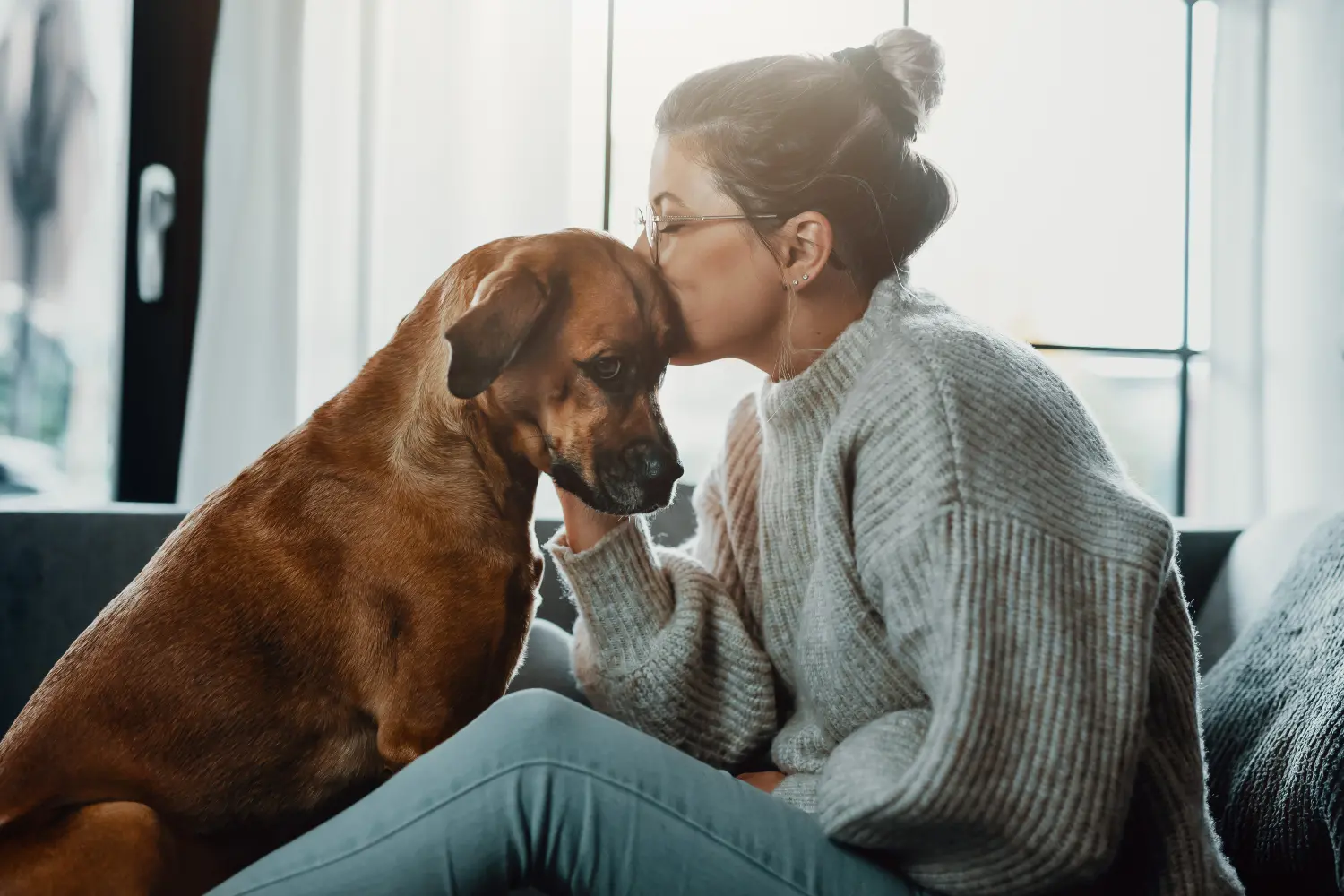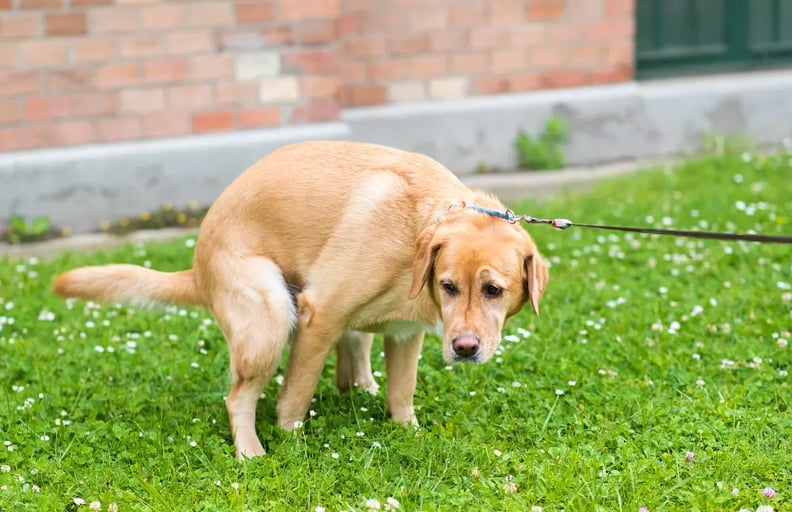
What do you do when your dog can't poop? Dog constipation is more than just uncomfortable. It can become serious if their condition isn't treated promptly. Learn simple tips and tricks for preventing and managing a constipated dog.
Dog constipation can be a concerning issue for pet owners. The condition causes distress to your beloved furry companion. Just like humans, dogs can experience irregular bowel movements, and when it happens, you'll need to understand the causes, recognize the symptoms, and explore effective remedies to alleviate your canine’s discomfort.
In this guide, we'll explore constipation in dogs to determine the factors that contribute to the condition, the signs and symptoms to watch for and possible solutions to give your pup much-needed relief and help restore the digestive balance and health. Remember, a constipated dog is an unhappy pooch.
Dog constipation occurs when your furry friend struggles to pass stool or experiences infrequent bowel movements. Just like in humans, when your dog is constipated, they can experience bloating, cramping, straining and pain.
Causes of Constipation in Dogs
A good first step in preventing and treating your dog's constipation discomfort is to learn why it's happening. Dog Digestion can be complex, but it fundamentally comes down to what they eat, what they drink, and how they exercise.
Some common causes of constipation in dogs can include inadequate fibre intake, dehydration, lack of exercise, certain medications, and underlying health issues such as intestinal obstructions, parasites, or diseases.
Senior dogs are often more prone to constipation due to the natural aging process, which can slow down their digestive system.
Food is always a good place to start. Low-quality or poorly balanced diets can easily lead to constipation, diarrhea, or other common digestive issues in dogs. Consider trying a higher quality dog food or incorporating some wet food or a meal topper to increase moisture and digestion.
Why is my dog constipated - possible causes:
-
- Insufficient water intake
- Lack of dietary fibre
- Inadequate exercise
- Obesity
- Underlying health issues (e.g., kidney disease, diabetes)
- Ingestion of foreign objects
- Side effects of certain medications
- Stress or changes in routine
- Intestinal obstructions (e.g., tumours, hernias)
- Neurological disorders affect the digestive system.
Constipation is common in dogs, but it is not normal. Recurring or prolonged bouts of constipation or other digestive issues are a cause for concern. Once is a coincidence, twice is a pattern, and one that could indicate a more serious health issue.
If your dog suffers from persistent constipation, then you should schedule a consultation with your veterinarian for a complete exam to determine the cause of constipation.
Symptoms of Dog Constipation

In most cases, a constipated dog will show some easy-to-spot symptoms of their digestive issue. Symptoms of a constipated dog can vary, but common signs include:
-
- Infrequent Bowel Movements: If your dog is having significantly fewer bowel movements than usual, it could indicate constipation or something more serious like an intestinal blockage.
- Straining: A constipated dog will often strain or crouch for an extended time in an effort to produce stool. In some situations, the pup might also scoot their bottom across the floor or excessively lick the anal region in an effort to gain relief.
- Hard, Dry Stools: Constipated dogs often pass small, dry, and firm stools, which can be difficult for them to eliminate. It often takes a great deal of strain to pass one small piece of stool. This is one of the main constipated dog symptoms to watch for.
- Lack of Appetite: Constipation can cause discomfort, leading to a decreased appetite in dogs.
- Lethargy: Dogs experiencing constipation might appear lethargic or less active than usual.
- Discomfort or Whining: Your dog might show signs of discomfort, such as whining, especially when trying to defecate.
- Visible Discomfort During Bowel Movements: Constipated dogs may exhibit signs of discomfort, like yelping or crying, while attempting to have a bowel movement.
- Bloody Stools: In severe cases, constipation can lead to rectal bleeding or the presence of blood or mucus in the stool.
If you notice any of these dog constipation symptoms persisting or worsening, it's crucial to consult a veterinarian for proper diagnosis and treatment.
Help - My Dog is Constipated!
No one likes to see their furry best friend in distress. First, you want to figure out how to make a constipated dog poop quickly.
Wondering how to treat constipation in dogs? Check out the below dog constipation home remedy solutions:
-
- Increase Water Intake: Yes, the best constipated dog home remedy is simply water. Ensure your dog has access to fresh, clean water at all times. Staying hydrated can soften stools, making them easier for your doggo to pass. Feeding a high-moisture diet is also recommended.
- Dietary Fiber: Treating constipation in dogs is often as easy as adding fibre to Fido’s diet. Gradually introduce high-fiber foods into your dog's diet. Canned pumpkin (pure pumpkin, not pie filling) is an excellent source of fibre. You can also consider adding fibre supplements recommended by your veterinarian.
- Regular Exercise: Encourage regular physical activity. Exercising your dog daily promotes healthy digestion and can help prevent constipation.
- Grooming: Keep the area around the anus trimmed and clean for dogs with long fur. Sometimes, feces can stick to the fur, causing discomfort and difficulty in defecating.
- Laxatives and Stool Softeners: Use veterinarian-approved laxatives or stool softeners. Never administer human medications without consulting a vet, as some can be toxic to dogs.
- Probiotics: Probiotic supplements can aid in promoting a healthy gut, which, in turn, can prevent constipation.
- Avoid Certain Foods: Avoid feeding your dog cooked or non-edible bones, as these can splinter and cause blockages. Also, human foods and too many snacks can contribute to poor digestion.
- Regular Meals: Simply establishing a regular feeding schedule is one of the best constipation remedies for dogs. Regularity in meals often leads to more predictable bowel movements.
- Medical Attention: If your dog's constipation persists for more than a day or is accompanied by vomiting, lethargy, or blood in the stool, consult a veterinarian immediately. These could be signs of an underlying health issue that needs professional attention.
Always consult your veterinarian before making significant changes to your dog's diet or introducing supplements to ensure the best approach is tailored to your pet's specific needs.
Treating constipation in dogs involves a combination of dog constipation home remedy solutions, dietary changes, and, in some cases, veterinary intervention. There isn't always an easy solution for how to make a constipated dog poop quickly, so if your at-home remedies are not effective or if your dog's symptoms are worsening, then it's time to call your vet.
When to Seek Veterinary Assistance for a Constipated Dog

Persistent or chronic constipation causes an accumulation of dry fecal matter in the dog's colon, leading to a condition known as obstipation. Chronic constipation may also contribute to megacolon, characterized by an inability to defecate normally, as the colon becomes distended and loses its natural motility.
Before your vet appointment, make a list of information such as:
-
- The last time your dog had a regular bowel movement.
- Description of stool colour and consistency.
- Any recent changes in the dog’s diet or routine
- Non-food items the dog may have ingested (ranging from bones to kitty litter)
- Signs of straining or pain during defecation.
- Any drug treatments your dog is undergoing.
- Details about any injuries.
- Other signs of distress or discomfort include vomiting, lethargy, or bloating.
Many instances of constipation can be resolved with mild remedies like increased fluid intake, dietary fibre, and exercise. However, the use of laxative suppositories and enemas should be supervised by your dog's veterinarian.
A severe case of dog constipation may require veterinary care to resolve:
-
- Manual removal of impacted stool (a.k.a - an enema!)
- Medications to stimulate normal colon function or inhibit the production of specific enzymes.
- Surgical procedures, typically for extreme conditions like megacolons. One such surgery is a colectomy involving the removal of sections of the colon.
For the majority of dogs, constipation remains only an occasional problem. In most situations, constipation is preventable through a balanced diet, access to fresh water, and regular physical activity.
Dog Constipation Prevention and Remedies
The earlier you catch discomfort or changes to your dog's regular bathroom habits, the easier they are to treat quickly and safely. Supporting healthy digestion all the time is the best way to prevent common gut issues like dog constipation, but some dogs need a little extra support to treat and prevent it.
Below are a few constipation preventatives and remedies that can naturally restore your furry friend’s digestive tract health:
-
- Thrive Slippery Elm Powder: If your dog is suffering from constipation, try Thrive Slippery Elm Powder. The all-natural solution coats the dog's intestinal tract to reduce inflammation and provide much-needed relief. It is a fast-acting formula.
- Diggin' Your Dog Super Snouts - GI Balance Supplement: The powdered supplement features pumpkin for dog constipation, which helps reduce the reabsorption of water so there is more fluid present in the stool, making it easier for the dog to pass.
- Thrive ProGut: If your senior dog is suffering from constipation, then ProGut might provide the essential vitamins, digestive enzymes, probiotics, fibre, and minerals to help the pet’s digestive tract more easily break down the food and the stool pass easily. It also promotes regularity.
- HomeoPet Digestive+ Drops: This homeopathic remedy provides relief from minor digestive discomfort, including diarrhea and constipation.
Frequently Asked Dog Constipation Questions

What happens when your dog is constipated?
Constipation in dogs results in infrequent or difficult bowel movements, causing discomfort and straining when trying to pass stool.
How do I know if my dog is constipated?
Dog constipation symptoms include reduced bowel movements, visible straining, small or hard stools, abdominal discomfort, and loss of appetite.
What causes constipation in dogs?
Causes of dog constipation include insufficient water intake, dietary issues, lack of fibre, underlying health problems, or obstructions in the digestive tract.
What can I give my dog for constipation besides pumpkin?
Veterinarian-approved constipated dog remedies include high-fibre dog food, probiotics, and increased water intake. In more extreme cases, prescription laxatives or stool softeners may be recommended by your vet.
Can you give a dog a laxative for constipation?
Yes, constipated dogs may benefit from laxatives, but only under veterinary guidance; some human laxatives can be harmful to dogs. Always consult a vet before administering any medication.
Can worms cause constipation in dogs?
Yes, intestinal parasites like worms can lead to constipation in dogs by causing blockages or irritations in the digestive tract. Regular deworming is essential.
.png?width=200&height=66&name=logo%20(1).png)


